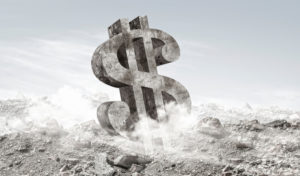
By Sergey Nivens @ Shutterstock.com
“Everyone understands the basic need for fixed weights and measures in daily life: the amount of liquid in a gallon, the number of ounces in a pound, the number of minutes in an hour. None of these amounts fluctuate; they are unchanging,” writes Steve Forbes. Here’s his latest Fact & Comment on the greenback.
The dollar. Markets are finally waking up to the implications of the weak dollar, which has been declining for months. The greenback’s slide has been nowhere as bad as it was in the early 2000s, but the trend isn’t good. Treasury secretary Steven Mnuchin let the cat out of the bag a few days ago when he called for a dollar devaluation. As he soon learned, this is a no-no. You aren’t supposed to be so open and blunt. His predecessors could have coached him on how to signal you want a cheaper dollar without explicitly saying so. Chastened, Mnuchin claimed he was misquoted. But the markets got the message all too clearly: We’re in for a repeat of letting the dollar fall in value that was the disastrous hallmark of George Bush’s treasury secretaries.
An unstable and weak dollar does to marketplace prices what a virus does to a computer: It corrupts information. Prices are supposed to tell us the value of a product or service. If the price is going up, it signals that people want more of the thing. If it’s moving down, that means either people don’t want it as much or the supplier, through productivity, has made it more affordable. Prices in free markets are supersensitive, real-time conveyors of consumer wants and dislikes. They give us priceless information without which the economy couldn’t function.
The role of prices in a free-enterprise economy is basic and simple, yet people like Mnuchin remain oblivious to it. They think that if they devalue the dollar, that will boost exports and hinder imports, thereby improving our trade balance, which will make us economically stronger.
It’s all nonsense, as Adam Smith demonstrated more than 240 years ago. The U.S. has had trade deficits for most of its existence, and it has had capital surpluses—that is, more investment money coming into the country than going out—for most of its existence as well. A trade deficit or surplus alone tells nothing about the health of an economy.
In the real world if the dollar is weak that means nominal prices of hard assets, such as commodities, land, houses and buildings, go up.
That’s what happened in the 1970s. Oil, for instance, zoomed from $3 a barrel to almost $40. Normally, such a surge would mean there was an oil shortage. But the virus of a weak dollar had corrupted the information; there was no shortage. Oil wasn’t getting more valuable so much as the dollar was getting less valuable. When the inflation of that era was ended in the early 1980s, oil crashed to as low as $10.
In the early 2000s, the U.S. was once again seduced by the false god of a cheaper dollar. Suddenly oil went from $20 to $25 a barrel to more than $100.
The real disaster occurred in housing. Prices rose as the greenback got weaker, a situation made more destructive by the government actively pressuring financial institutions to make mortgages to low-income earners, with little to no down payment required.
It all led to the disaster of 2008–09.
Are we doing it again by undermining the dollar?
That’s the fear.
Late last year, while commenting on the potential options the president had for his choice of the next Fed chairman, I wrote that the best approach to monetary policy in America is sound money. I wrote “A better approach would be to focus on sound money, pure and simple, by tying the value of a dollar to an ounce of gold. Today an ounce of gold costs $1,275. That’s it. No rules to interpret just like there’s no need to interpret time throughout your day. There’s 60 seconds in a minute, and 60 minutes in an hour, that’s it. With a gold standard, you know the value of your dollars every second of the day.”
You should know the value of your dollars at all times, not have them manipulated to fulfill political goals.
E.J. Smith - Your Survival Guy
Latest posts by E.J. Smith - Your Survival Guy (see all)
- A Word on Stocks - July 26, 2024
- Is Vanguard Too Big? What’s Next? - July 26, 2024
- Boomer Candy? - July 26, 2024
- My BEST Insider’s Guide to Key West - July 26, 2024
- Having Fun Yet? Nasdaq Worst Day in Years - July 25, 2024














